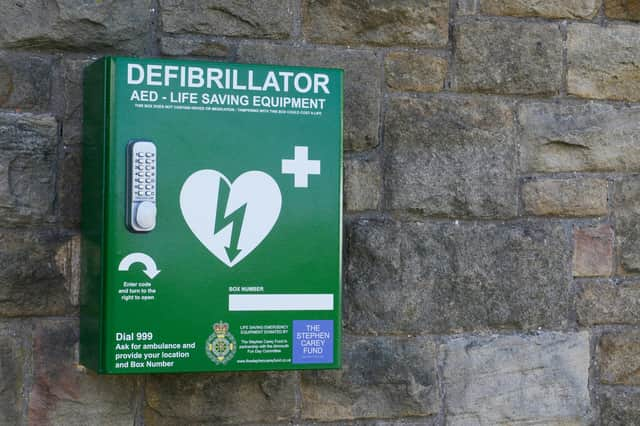Sheffield sports coach calling for more defib machines to be sited at workplaces after father collapsed on football field


Peter Dixon, a coach at Sheffield University Bankers Hockey Club, has launched a petition asking the government to change the law so that defibrillators are required in all businesses with 10 or more employees.
Christian Eriksen, a healthy 29-year-old, collapsed on live television while playing professional football for the Danish team at Euro 2020. The same happened to Peter Dixon’s father 23-years ago, who collapsed in front of his son on the football field. While Eriksen was saved by timely treatment, Peter was 15 when his father died.
Advertisement
Hide AdAdvertisement
Hide AdIn Britain, there are more than 30,000 out-of-hospital cardiac arrests (OHCAs) annually. The overall survival rate is less than 1 in 10. With the absence of cardiopulmonary resuscitation (CPR) and defibrillation every second, the chance of survival is reduced to less than 10 percent.
Of having defibrillators available more readily, Peter said: “They are only of any use if you’re within half a mile, so you will need many, many more. So, it’s all about that instant speed and instant access.” Peter explained: “A good defibrillator costs about £1,000. It’s very expensive for an individual, but not expensive for a business.”
Peter’s petition states that: “if the company employs 10 full-time staff then it should have one in the company building.” Peter also expressed the view that, if new properties are developed, defibrillators should be installed as a matter of course.
Many defibrillators never get to be used because, during emergencies, the individuals don’t know where they are or how to access them.
Advertisement
Hide AdAdvertisement
Hide AdThe Circuit is the national defibrillator network which provides a summary of where defibrillators can be found nationally.
Steve Irving, Executive Officer of the Association of Ambulance Chief Executives, said: “Knowing where all these PADs are located could greatly assist in survival from out-of-hospital cardiac arrest.”
The upcoming campaign to encourage defibrillator guardians to register their devices on the Circuit will raise awareness and allow more defibrillators to be available to the community.
Ambulance services and the Association of Ambulance Chief Executives (AACE) have been involved since the formation and development of The Circuit.
Advertisement
Hide AdAdvertisement
Hide AdAll 999 calls are triaged according to clinical urgency and the first question asked is: “Is the patient breathing?” If the answer is “no”, a cardiac arrest is suspected and advice can be given to the caller and those on the scene to perform CPR.
Whilst this happens, the nearest available ambulance is dispatched and the call taker will consult information on The Circuit as to where the nearest PAD is located and advise those on the scene to bring it to the patient.
Sue Hampshire, Director of Clinical & Service Development, RCUK, expressed a view that: “We must be careful not to promote defibrillators in isolation. The key to successful resuscitation lies in activating all links within the Chain of Survival.”
Resuscitation Council UK (RCUK) is another key stakeholder of The Circuit. As the national expert in resuscitation practice, they are also commited to improving bystander CPR and the provision and use of defibrillators in the community.
Advertisement
Hide AdAdvertisement
Hide AdIn fact, anyone can do CPR and use a defibrillator, which is very simple to use.
Steve Irving said: “It is about familiarisation, normalisation, instilling confidence in people to take action and supporting them in those actions. Organisations like ourselves and others are looking at barriers to this and also at the areas of most need… People tend to be scared of helping in a medical emergency as they have a fear of doing something wrong. The only wrong thing is doing NOTHING.”
Another life saving measure could be to teach CPR and AED awareness on the English senior school curriculum, along with a commitment from Wales and Scotland to include such teaching.
Sport can trigger heart issues, but how to raise enough money to buy defibrillators can be a big problem. Ruaridh Stewart, Chair of Sheffield University Bankers Hockey Club said: “It’s not a question of whether defibrillators are a necessity: the real question is why you wouldn’t have one available as part of your on-site medical equipment.”
Advertisement
Hide AdAdvertisement
Hide AdMost commercial gyms are known to be equipped with defibrillators. Beth Sharp, a personal trainer at Pure Gym, said that staff have been taught how to use defibrillators at a first aid course as they are responsible for their clients.
If gyms can install defibrillators as a matter of course, then it makes sense for workplaces to do the same.